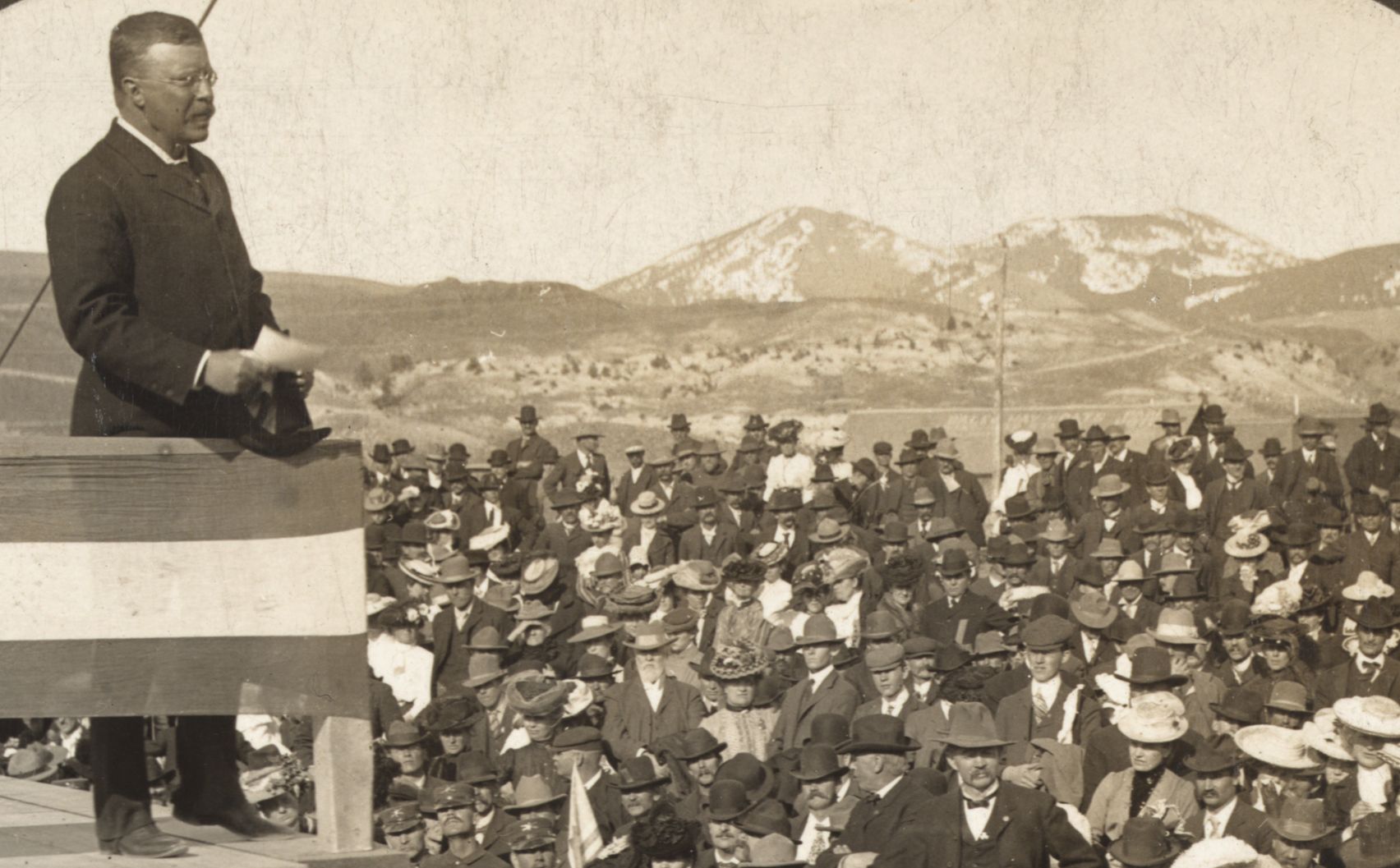TR had charisma, and energy. But his true strength was his inner moral core, his deeply held values.
-
Winter 2026
Volume71Issue1

Editor’s Note: Bret Baier is the Chief Political Anchor for Fox News and the author of six New York Times bestsellers, including To Rescue the Constitution: George Washington and the Fragile American Experiment. His most recent book, To Rescue the American Spirit: Teddy Roosevelt and the Birth of a Superpower, was called a “wonderfully readable biography, by Walter Isaacson. Portions of this essay appeared in that book.
To his adoring followers Theodore Roosevelt was a mighty force, usually pictured barreling into the heart of controversy, raising his voice to embrace a crowd of people who hung on his every word. He became one of the most beloved presidents, as well as the most constitutionally significant.
His friend Reverend Ferdinand Cowie Iglehart wrote in 1919 – the year of Roosevelt’s death – that he was the third hero to represent an important era of our nation’s history. The first, Washington, represented its birth. The second, Lincoln, represented its salvation. And the third, Roosevelt, represented its glory.
Another friend, the noted author William Roscoe Thayer, observed, “Nothing better illustrates the elasticity of American democratic life than the fact that within a span of forty years Abraham Lincoln and Theodore Roosevelt in origin, in training, and in opportunity, could hardly be found.... But, just as incredible adversity could not crush Abraham Lincoln, so lavish prosperity could not keep down or spoil Theodore Roosevelt.”
Unknown to Roosevelt’s contemporaries was the tremendous impact he would have on the nation for more than a century. They could not have defined his legacy; they only knew that there was something original and notable about this man. They could feel it in his presence.
“I never saw him go into a room occupied by friends, or foes, or both, but that he immediately became the central figure,” recalled Elihu Root, who served as both secretary of war and secretary of state during Roosevelt’s presidency. He was “the one great inevitable human factor present.”
Most people think Roosevelt’s greatest quality was his forcefulness – fearless risk-taking, bold adventures, physical prowess. But his true strength was his inner core, the uncorruptible center of his striving. His charisma was grounded in a deeply held value system, which found expression in everything he did. He was an interesting and authentic personality in a profession dominated by pompous, overly cautious, and often hypocritical men. He was thirsty for engagement, desperate to be in the arena. Until he died at age sixty, Roosevelt was on a mission to wring every moment out of life. A century after he left the world, we still think of him as larger than life. Although he was only five foot ten, he is a towering figure in our imaginations.

Beneath the physical man there was a burning curiosity, a deep sense of history. He was driven by questions: What is the meaning of America? What is the cause of Republicanism? What is the nature of good and evil? What is the responsibility of the citizen?
He despised the political critics who sat on the sidelines and lobbed criticisms without lifting a finger – the cynics who chose to believe that America was rotten and left it at that. He was far more than a glib and energetic force. He was also a constant moral presence who wrestled publicly and privately with what it meant to do good.
Presidents are defined not only by their times. They are defined by our times too. It’s easy to imagine Roosevelt living in our age of social media. He’d be a star. He’d be a force for optimism, a driver of action. He has been called the first celebrity president, which means only that he captured the imagination of the public in a new way. The power of Roosevelt’s personality and his tremendous vigor inspired optimism in the nation, which was manifested in the enthusiasm for breakthrough technologies and modern advances. “I have enjoyed life as much as any nine men I know,” Roosevelt once said. He always pushed the envelope in word and deed. He was never just pleased; he was “dee-lighted.”
Roosevelt reached adulthood at the height of the Gilded Age. “It was a time,” wrote Roosevelt biographer Carleton Putnam, “before the devastation of two great wars had taken their toll of both the human and the economic resources of Western civilization.” But in some ways the era was stagnant. The tender shoots of a fresh century were struggling to rise out of the mulch of the last one, and the public was eager to see them flower.
It has often been said that Theodore Roosevelt dragged America kicking and screaming into the twentieth century, but when he became a national figure, the country was ready to make that leap. It just needed a captain to lead it there. Roosevelt’s exuberance might have had little effect if the people had not been eager to follow him. There had never been a president like Roosevelt. He brought the backroom maneuverings of politics out onto the stage, where Americans could engage in the performance. But he also had the good fortune to be born at a time when the world was turning a corner, and Americans, intoxicated by the prospects of growth and progress, were eager to push against the limits of a more sedate era.

How did this “inevitable” man come to be? Why was he considered such a hero? Historian Gregory Mason asked himself that question in Remember the Maine, reflecting that “All his life Roosevelt was an eight-year-old boy ... [or] at least, a ten-year-old boy. How, then, was he a national hero?
The answer is that he was a hero to a nation that was ten years old too, in the development of its personality.... We needed a leader who felt his oats as we did, and we had him in the boyish, irrepressible Teddy.”
But it was more than his irrepressible nature that gave Roosevelt such historic heft. Mark Sullivan’s seminal book about the era, Our Times: America at the Birth of the Twentieth Century, captured the depth of Roosevelt’s influence in potent prose:
He was the people’s champion. He heard their grievances and delighted in the wisdom of their simple longings. He took their side against the powerful despite his own privileged origins, returning to them a measure of power that was their American birthright. They loved him for it.

